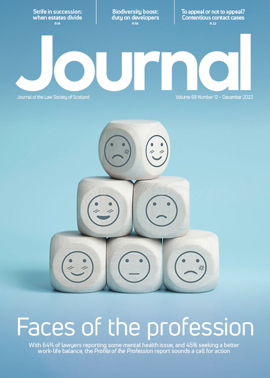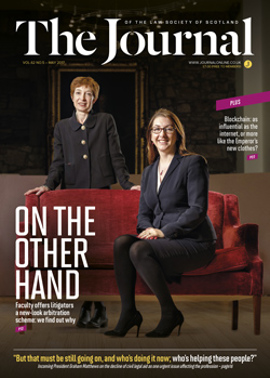Life beyond in-house

You have an unusual career path. Can you tell us more about it?
I accept that I have one of the more unusual, even interesting, career paths that you will find for a Scottish lawyer. In fact, I am no longer a lawyer, or to be more accurate I’m now a “recovering lawyer”.
My early career aspirations did not include the law. Following school I obtained a chemical engineering degree at Edinburgh University. Although I knew fairly early that I didn’t want to pursue an engineering career, it took me a few years to realise that my calling was law. My only point of reference was the then hit TV show LA Law (something like Suits for today’s younger generation). I did however find the idea of practising law, in particular being a court lawyer, very appealing.
After working for a couple of years, I had sufficient money to take the accelerated two-year LLB and the Diploma in Legal Practice at Aberdeen University. In 1995, I joined Aberdein Considine for my traineeship, and stayed on for a period after qualifying. After some exposure to the life of a court lawyer I quickly realised it was somewhat different from the world of TV dramas!
I decided to move in-house and joined Aberdeen Asset Management plc (AAM) in 1997. For the next 12 years I held a number of legal roles at AAM and then Scottish Widows Investment Partnership. The wide range of work from advising on regulatory matters to a significant number of corporate transactions and M&A work was both great fun and stimulating. Like many general counsel, I found the management and problem-solving parts of my role significantly increasing over time, with the pure legal elements decreasing. Thankfully, I was probably better suited to these new skills and it was therefore not a huge step to develop my career more in the business and commercial parts of the company.
In 2010 I was delighted to have the opportunity to move roles from the legal and regulatory sphere to became the sales and marketing director. I accept that this is not the most natural or possibly even logical career step for many lawyers, but I believe the skills that we learn as lawyers are a great basis for business and commercial management.
At that point I also gave up my practising certificate. I soon realised that I wasn’t going to be that employable as a lawyer if I didn’t keep my hand in, or up to speed with developments in the law.
I moved back to AAM in late 2011 to head distribution for the AAM Group. For the next five years I was very fortunate to work with some fantastic people and for a world- class investment firm. My role was both challenging and exciting, and really focused on people management, understanding client requirements and helping the company achieve its strategic goals. This also included international expansion and a number of acquisitions and subsequent integrations. There were many occasions where my former life came in very helpful. Thankfully not my legal knowledge, but the wider logical thinking, problem-solving and communication skills have been called on frequently.
Have your legal skills and background been helpful to your business career? Are they still relevant today?
Absolutely. The ability to absorb large amounts of information and focus on the key points, or to solve problems, or even the skill of clear communication, are also key requirements for successful management in business. If you can add in some people skills and a little emotional intelligence, then the basic skills we learn as lawyers can be a great springboard into commercial management.
After many happy years in executive roles within investment management I decided to aim for a more balanced life of semi-retirement, and even to spend a little time with my family (and dog). I now have a “plural” portfolio of roles, including one that brings me almost full circle to my early legal career. I am currently the CEO of Anderson Strathern Asset Management (ASAM), a small wealth management firm that is attached to law firm Anderson Strathern LLP (AS LLP).
Although I am no longer a lawyer, I have found my background in law, coupled with my investment management industry experience means I am better equipped to help AS LLP provide a full spectrum of professional services to their clients. In addition to my role with ASAM, I hold a number of non-executive directorships, am trustee for a Scottish charity, Water Witness International, and run my own financial services consulting firm. The non-executive director and trustee roles clearly require governance and oversight skills. I can’t really imagine a better grounding for these types of role than a legal background. The ability to challenge, to analyse information and to show strong independent and ethical behaviours are all essential to the successful and effective performance of these roles.
Would you recommend a similar career change to other lawyers?
I avoid giving specific career advice, but I would always encourage someone to look laterally at their choice of roles and career path. I think it is more helpful to look first at what types of task you enjoy at work and what soft skills you possess, and then look at the specific role and career path. I am a firm believer that if you play to your strengths and do something you really love, you will be more successful and much happier.
What makes a good in-house lawyer?
Above all else I look for commercial advice where the adviser is prepared to make a firm recommendation. It is always refreshing to find a lawyer that helps you deliver your commercial goals instead of looking at your issue as a generic legal problem. This is always enhanced when the lawyer really understands your business or industry and can therefore make practical suggestions and recommendations. I also prefer to receive “risk aware” advice instead of “risk averse” advice. It stands out when your adviser helps me make informed decisions instead of simply focusing on risk reduction.
What did you enjoy about being an in-house counsel?
Like many other in-house lawyers, I found the role rewarding and the ability to directly influence decisions made by my company, professionally satisfying. In the early years, I found it could be frustrating when the company or senior management did not implement my advice. This didn’t last too long as my commercial exposure increased and I became more aware of the business drivers of the company and the risks associated with the sector. I really enjoyed the commercial aspects of the role and the opportunity to contribute to the success of the wider business. Many in-house counsel are more “general advisers” to their business, which I found more enjoyable than being an external adviser.
What does a typical day look like?
That really depends which role I am undertaking that day. However the day typically starts with a cup of “builder’s tea” and some Crunchy Nut Cornflakes. By then I have normally checked my emails and answered anything from the previous evening. I catch up with the business news and then try to walk to work, though too often I fall into the trap of driving. Most days in the office include a number of team meetings or one-to-one meetings with team members. I try to find time every day to think about the strategic side of the business and use this as a check on whether current activities are really aimed at delivering our strategy.
Most days include a number of unscheduled conversations where someone is seeking an opinion or views on one of their challenges, which often leads to thinking and problem solving time. Emails are ever-present and I dedicate some time each day to making sure I have not missed anything important and completing any outstanding actions.
Wherever possible I try to find 15 minutes around lunchtime to have a brief walk and clear my head. I find it increasingly important to have some mental down time each day to stay fresh and effective. Despite my different roles I have found I can manage my time more effectively, and I try to switch off my phone before dinner – and to resist the temptation to check emails into the evening.
What do you do outside work?
After spending many years travelling extensively for work, I now try to spend as much time as I can in Edinburgh with my family. I try to find time to walk for an hour or so each day, and more at the weekends. I can highly recommend a dog to force you to exercise.
I am no longer obsessed by football but still maintain an unhealthy interest in the game. I am a season ticket holder at Celtic and take both children to most home games. Beyond these simple pleasures I have been known to enjoy cooking (more importantly eating) and the odd glass of wine.
What would you take to a desert island? What would you put in Room 101?
I would love to have access to Sky Sports/BT sport, or I could settle for Spotify to allow me to feed my love of football and music. If that’s not possible, I would have to settle for a never-ending supply of peanut M&Ms.
Room 101 is slightly harder: the potholes in Edinburgh roads stand out to me, or perhaps the regular unsolicited calls from companies asking me if I want to replace the boiler in the house. Both are high on my list of major irritants.
In this issue
- “Without prejudice” save as to costs?
- Sanction for counsel: the new landscape
- Keeping payment practice up to scratch
- Access and the call of nature
- Why punish?
- Caught in the past
- Reading for pleasure
- Opinion: Louise Johnson
- Book reviews
- Profile
- President's column
- PAS proves a hit
- People on the move
- Beating the system?
- People perspective
- Leaving the EU: the legislative future
- Ledger for the digital age
- Charities - navigating a new landscape
- Do you know how much is enough to retire?
- Don't call it just a job
- Sanction: appeals not encouraged
- Child abduction: two aspects
- Challenges of gender identity
- Prior warnings and reasonable belief
- Powers in the past
- Scottish Solicitors' Discipline Tribunal
- Missives: can we conclude more quickly?
- Life beyond in-house
- Law reform roundup
- Career planning for women: a new conference
- AML: regulations bring new focus
- Fraud and cybersecurity: are you on the ball?
- Ask Ash
- Incidental financial business licence: the widening scope
- Love me, love me not?
- Appreciation: Kirk Murdoch
- Expert Witness Index 2017
- All in together






